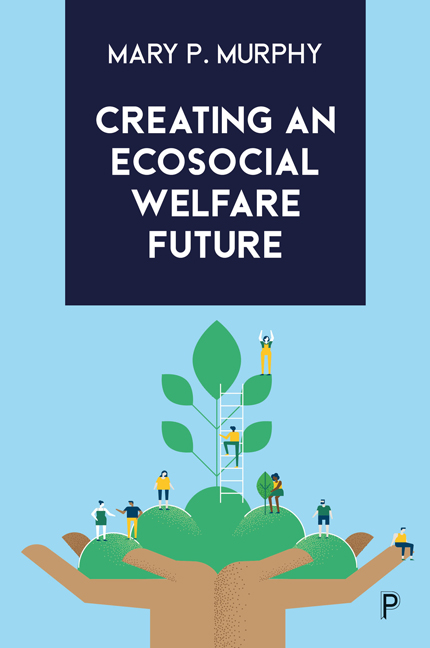Book contents
- Frontmatter
- Dedication
- Contents
- List of figures and tables
- Acknowledgements
- Introduction: The case for a welfare imagination
- PART I From problems to solutions: a post-growth ecosocial political economy
- PART II Building an ecosocial imaginary
- PART III An ecosocial political imaginary
- Conclusion: The case for systemic transformation
- Appendix: Ireland
- Notes
- References
- Index
Appendix: Ireland
Published online by Cambridge University Press: 20 January 2024
- Frontmatter
- Dedication
- Contents
- List of figures and tables
- Acknowledgements
- Introduction: The case for a welfare imagination
- PART I From problems to solutions: a post-growth ecosocial political economy
- PART II Building an ecosocial imaginary
- PART III An ecosocial political imaginary
- Conclusion: The case for systemic transformation
- Appendix: Ireland
- Notes
- References
- Index
Summary
This appendix offers readers who are unfamiliar with Ireland a brief introduction to the 100-year-old Irish state and its institutional features. Understanding Ireland's distinct social ecology and how it impacts on the functioning of politics, administration and economy is important to make sense of the case study sections at the end of each chapter. Apart from its openness and peripherality, three features of the Irish state merit particular attention from the perspective of transformation: the small size of the state (approximately 5.1 million in 2022); its highly centralised distribution of power; and the scale and speed of recent change.
Institutions
Irish public and policy institutions have evolved in a relatively consensusoriented democracy characterised by a centralised multi-party system with a two-chamber parliament and a prime minister (Taoiseach) with a moderate amount of influence. The institutional and policy context is characterised by the paradox of a strongly centralised state and weak local government, alongside a political culture dominated by strong localism that is reinforced by a proportional national electoral system organised around 41 constituencies. A growth in agencies is fracturing central power and creating new veto points which pose challenges for climate and social policy implementation (Torney, 2020). While local county loyalty is strong, sub-national or ‘county’-level power in Ireland is weak, with low density populations and one-off housing creating consequences for institutional capacity, planning and governance (Dekker, 2020). The local autonomy index (Ladner et al, 2015) ranks Ireland as one of the weakest countries in Europe with respect to local autonomy, with strong limiting consequences for the potential role of local government in local procurement and regional planning. In comparative terms, Ireland is grouped with countries with unitary governance and weak local autonomy including Portugal, Romania and Slovenia.
The relatively unique electoral system – proportional representation through a single transferable vote (PR-STV) – reinforces a pre-existing political culture of brokerage and clientelism and fosters localism and a strong sense of local community and loyalty which was a strong asset in the context of pandemic responses and is potentially an anchor for societal responses to climate change.
- Type
- Chapter
- Information
- Creating an Ecosocial Welfare Future , pp. 167 - 174Publisher: Bristol University PressPrint publication year: 2023



